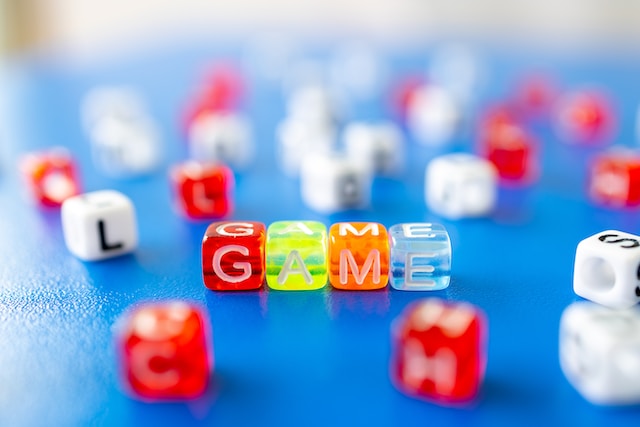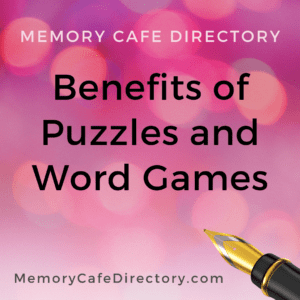Memory Cafe Directory posts and/or links to retailers can be advertising, sponsored, or affiliate links. We may earn a small commission from them. Thank you.
Puzzle and Word Games: How People Living with Dementia Can Benefit from Them
As someone who cares for a person living with dementia (or as someone living with dementia) you know there are plenty of challenges in dealing with this condition.
But did you know there are ways to boost your cognition and mental well-being through puzzles? That’s right! Puzzle and word games can be excellent sources of entertainment and mental stimulation for people living with dementia.
In this article, we’ll explore the various ways these types of games can benefit you. You’ll learn how they can help improve your memory, attention span, problem-solving skills, and social connections.
Your day-to-day life may be different now, but it doesn’t have to be any less enjoyable. With some careful strategizing and puzzle/word gaming, you can still enjoy life while positively managing your dementia.
What Is Dementia?
Dementia is a term used to describe a group of symptoms associated with a decline in mental abilities, such as memory, language, problem-solving, and judgment. It is caused by physical changes in the brain which can take place over time and is most often seen in people over 65.
Sadly, this means that many older adults are at risk of developing dementia, but there are ways to help reduce or delay its onset. One such way is through the use of puzzle and word games – activities designed to improve your brain’s cognitive functions and boost your language skills.
Studies have found that engaging in these types of activities regularly can help slow down the progression of dementia and possibly even improve overall mental functioning.
These activities provide an excellent opportunity for persons living with dementia to stay connected with their loved ones and continue to enjoy life despite their diagnosis. Not only do puzzles and word games keep their minds engaged, but they also help boost their self-confidence as they exercise their mental powers.
Additionally, playing together gives everyone involved the chance to socialize positively – something that can be difficult when dealing with a chronic illness such as dementia.

Photo by Andrey Metelev on Unsplash
The Benefits of Puzzle/Word Games for Persons Living with Dementia
Puzzles and word games have been found to have numerous benefits for persons living with dementia. While these activities should never be used as a substitute for medical care or treatment, they can provide cognitive stimulation, improve communication, and help to reduce anxiety, agitation, and restlessness.
Perhaps most importantly, puzzle/word games can provide meaningful engagement and improve the quality of life for persons living with dementia. The structure of puzzles and word games is particularly helpful in dementia care.
Not only do the activities help the individual to focus their attention on meaningful tasks, but the structure also helps to orient them in time and space, giving them a sense of accomplishment when they complete a puzzle or find the right word.
Moreover, puzzles and word games can be adapted to suit various levels of ability—from simple dot-to-dot pictures up to more challenging crosswords or word searches that require recall of memory and greater focus.
This allows persons living with dementia to remain engaged in an activity that is appropriate for their level of ability while feeling successful at completing it.
How Puzzle/Word Games Can Help to Stimulate Memory Recall
Puzzles and word games are a great way to help persons living with Dementia stimulate their memories. Puzzles and word games can help sharpen the mind, challenge the brain, and help them develop new strategies when it comes to recalling memories.
When engaging in puzzles and word games, the brain is forced to access deeper levels of cognitive functions, including memory recall abilities.
Brain Exercises
Puzzles and word games make fantastic brain exercises as they require persons living with Dementia to find solutions or answers, which can help stimulate memory recall. Brain exercises like these can also be therapeutic by helping them to stay alert even when their condition may not allow it.
Encouraging Communication
Puzzles and word games can also encourage communication between caregivers and persons living with Dementia by allowing them to talk about a subject that interests them both. This can be very beneficial as it helps them express themselves in a comfortable environment that stimulates their memories.
Puzzle and word games offer many benefits from stimulating memory recall to encouraging communication between caregivers. This makes them an excellent option for those looking for ways to stay mentally active while managing their condition.
Recommended Types of Puzzle/Word Games for Persons Living with Dementia
Puzzle/word games can be extremely beneficial for persons living with dementia. For example, word searches, crosswords, jigsaw puzzles, and memory games are all excellent activities that can help them develop and keep their cognitive skills. However, it is important to choose the right type of puzzle for your loved one.
Word Searches
Word searches are an excellent way to exercise the brain. The goal of a word search is to find hidden words in a matrix of random letters. This helps persons living with dementia build their vocabulary and become familiar with words they may not have seen before.
As they search for the words, they also strengthen their problem-solving and concentration skills. Plus, the light physical activity required while finding these words helps promote dexterity and increase hand-eye coordination.
Crosswords
Crosswords provide a great opportunity for persons living with dementia to create associations between different pieces of knowledge and increase their spelling accuracy. This fun game can also help them work on their decision-making and recall skills as they try to answer questions on various topics such as history or geography.
Jigsaw Puzzles
Jigsaw puzzles offer persons living with dementia a great way to practice problem-solving techniques in a fun environment. It can help improve concentration skills while allowing them to complete visible tasks which are incredibly rewarding.
Working on jigsaw puzzles can also help boost confidence for people living with dementia as it provides them with an achievable goal or task that will facilitate some level of success and accomplishment when completed.
Memory Games
Memory games provide persons living with dementia the chance to exercise their mental acuity while having fun at the same time. It is recommended they limit themselves to no more than three cards.
Strategies for Developing Problem-Solving Skills Through Puzzle/Word Games
If you are looking for an activity to help your loved one with dementia develop problem-solving skills, puzzles and word games can be the perfect solution! These types of activities can help improve cognitive function while providing a fun way to improve language and memory skills.
Here are some strategies you can use to develop problem-solving skills through puzzle and word games:
Repetition
One of the best strategies for developing problem-solving skills is repetition. Puzzles and word games can become increasingly difficult over time, making them ideal for helping your loved one progress in their ability to solve problems.
You could start with simpler puzzles like crosswords or jigsaw puzzles and then move on to more complex challenges such as Sudoku or Word Scramble as their abilities allow.
Visual Clues
Puzzles and word games often rely heavily on visual clues, which can be beneficial when it comes to enhancing cognitive abilities. By using colorful pieces or pieces of different sizes in each game, your loved one will be able to easily distinguish between pieces and how they fit together. This will help them develop their problem-solving skills more quickly and efficiently.
Active Participation
An important part of developing problem-solving skills is actively participating in the game. Therefore, you shouldn’t just give the answers, but rather guide your loved one through the process of finding the correct answers themselves.
Ask questions about what they believe a piece might fit or let them use trial-and-error when solving a puzzle or word game so that they can develop their strategies for success.
How to Find Suitable Puzzle/Word Games for Persons Living with Dementia
Once you’ve decided that puzzle/word games can be beneficial for a person living with dementia, the next step is to choose the right game. With so many options out there, it can be overwhelming to make the best choice.
Here are some tips on how to find suitable puzzle/word games:
Choose Games Based on Skill Level
Choose puzzle or word games that match the person’s skill level and interests. If the person is a beginner, look for simpler puzzles or word games like crosswords and word searches that don’t require much strategy or calculation.
On the other hand, if they are experienced with puzzle and word games, more complex or challenging options such as Sudoku and cryptograms may be ideal.
Choose Interactive Games
Interactive puzzles or word games can provide an additional layer of enjoyment and engagement for persons living with dementia. Look for apps, board games, or digital versions of traditional paper puzzles where players compete against each other—this way everyone playing will have an active role in solving the puzzle.
Let’s Play!
Puzzle/word games have been proven to be beneficial to persons living with dementia. Not only do they help to reduce stress and anxiety, but they also help to improve cognitive function. They are a great way to keep the mind active, and can even help to increase communication and social engagement.
Furthermore, these games provide a way for persons living with dementia to stay engaged and entertained in a meaningful way. Puzzle and word games can provide them with a sense of purpose and accomplishment and can help to provide a sense of calmness and relaxation.






